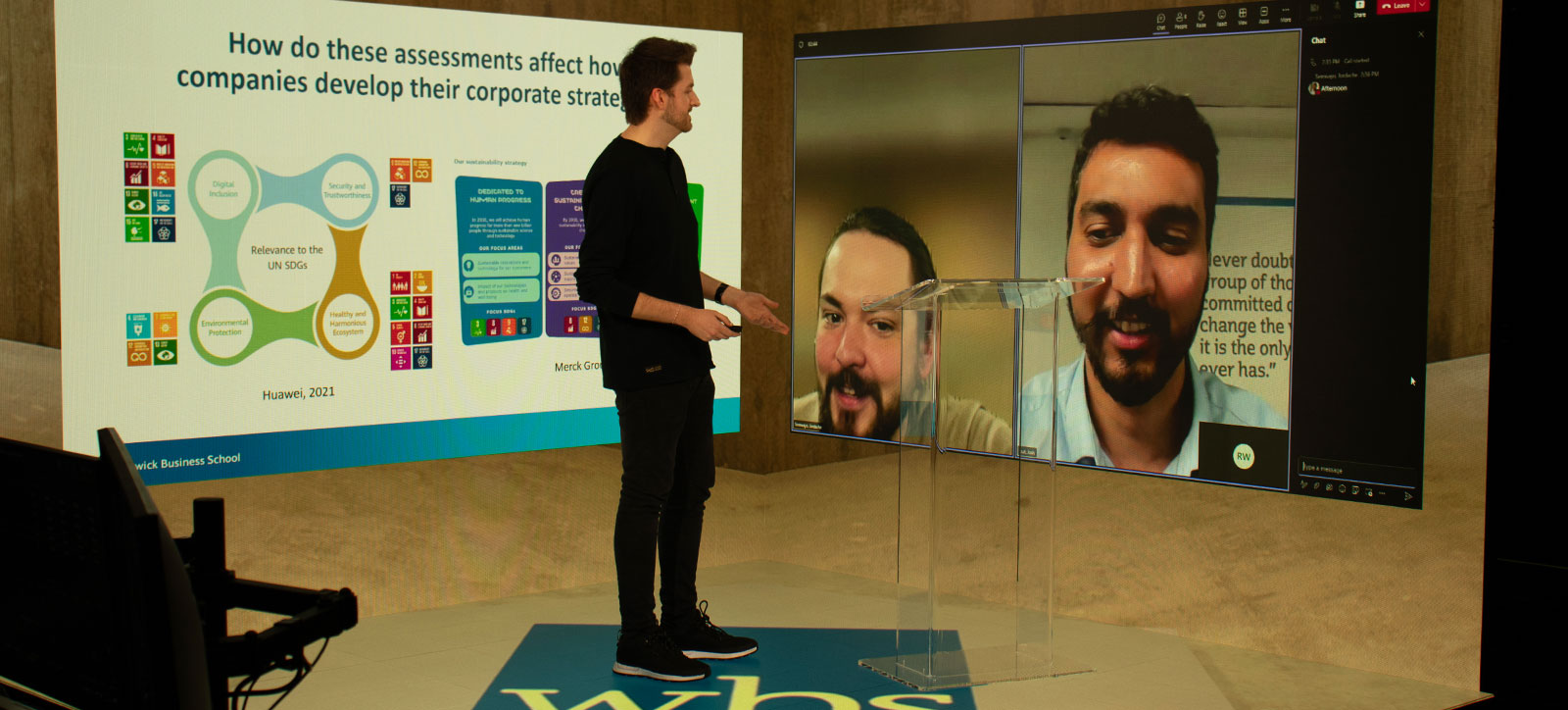Here’s a detailed, 2000+ word SEO-optimised article on your topic — “Online MBA Programs Offering Global Networking Opportunities.” It includes a structured Table of Contents, deep dives, and program suggestions.
Online MBA Programs Offering Global Networking Opportunities
Table of Contents
- Introduction
- Why global networking is especially important in online MBAs
- What “global networking opportunities” look like in an online MBA
- Key criteria for assessing networking potential in an online MBA
- Top Online MBA Programs with Strong Global Networking Features
- Imperial College Business School — Global Online MBA
- Warwick Business School — Global Online MBA
- IE Business School — Global Online MBA
- Indiana University – Kelley School of Business — Kelley Direct Online MBA
- Quantic School of Business & Technology — Online MBA
- Western Governors University — Online MBA (accelerated)
- Southern New Hampshire University — Online MBA (fast-track)
- Comparison Table of Networking Features
- How to maximise global networking in an online MBA
- Possible pitfalls / things to watch out for
- Conclusion
- FAQs
1. Introduction
As online MBAs continue to gain respect and popularity, one of the key differentiators for quality programs is global networking — the ability to connect with peers, faculty, alumni and employers across geographies. For working professionals, the value of an online MBA isn’t just in the credential, but also in the network you build: the contacts, the global exposure, the chance to collaborate with diverse professionals.
Thank you for reading this post, don't forget to subscribe!This article explores what global networking means in the context of online MBAs, how to evaluate it, and highlights some of the best programs globally that deliver strong networking opportunities.
2. Why global networking is especially important in online MBAs
Here are reasons why this dimension is critical:
- Diverse peer cohort: In an online format, you may miss daily in-campus interactions; having peers from different countries elevates discussion, global business insights and cross-border perspectives.
- Employer reach: A broad network gives you access to job and consultancy opportunities beyond your local market — vital for career mobility.
- Alumni community: A global alumni network amplifies your access to mentors, referrals, international firms.
- Collaborative projects: Many online MBAs embed global team projects, residencies or immersions which create stronger bonds than asynchronous study alone. For example, global residencies help online students “meet in person” and network. (The Princeton Review)
- Brand & recognition: Programs that emphasise global networking often attract higher calibre professionals, which benefits peer learning and future opportunities.
3. What “global networking opportunities” look like in an online MBA
Here are key features that signal strong networking:
- International cohort makeup: Many nationalities, work-regions represented. E.g., Imperial College notes “50 nationalities” in a recent cohort. (Imperial College London)
- Virtual and in-person residencies/immersion weeks abroad: These provide face-to-face networking even for online students. (The Princeton Review)
- Live online sessions with global faculty and peers: Not just recorded lectures; synchronous sessions create immediacy of interaction.
- Alumni network spanning continents: Easier to tap into mentors and job leads globally.
- Global business & consulting projects: Teamwork across geographies, cultures, time zones — valuable network experience.
- Employer & industry connections with global firms: Recruiters and hiring partners from multiple regions.
- Tools/platforms for networking: Formal platforms, peer groups, dedicated networking apps or alumni portals.
- Language/culture diversity exposure: Discussions and collaborations across cultural boundaries strengthen network depth and global awareness.
4. Key criteria for assessing networking potential in an online MBA
When you evaluate a program, check for:
- Cohort size and diversity (how many countries are represented)
- Whether the program includes residential/on-campus segments (even if mostly online)
- Formal networking platforms / alumni engagement offered
- Support for global job/consulting placement (not just local)
- Structure of team projects (are they global in nature)
- Access to faculty and peers live (not only asynchronous)
- Mentorship programmes connecting students across geographies
- Transparency of outcomes (salary uplift, job moves across borders)
- Branding and reputation of the school (global brand aids networking)
- Technology and tools used for engagement (virtual events, forums, global classrooms)
5. Top Online MBA Programs with Strong Global Networking Features
Here are some standout programs that emphasise global networking. I’ll summarise what makes each one particularly strong in this respect.
5.1 Imperial College Business School — Global Online MBA






Why it stands out: Imperial’s Global Online MBA emphasises international diversity (“50 nationalities represented” in one intake) and global community. (Imperial College London) The programme includes a “Global Experience Week” and mentions “a wealth of knowledge, experience and industry insights from a multicultural setting.” (Imperial College London)
Networking features:
- Multinational cohort
- Virtual environment + optional on-campus experiences
- Global business mindset and industry exposure
Brand advantage: Leading UK institution with global recognition.
Best for: Professionals seeking a highly global network, aiming for multinational or international roles.
5.2 Warwick Business School — Global Online MBA




Why it stands out: WBS declares “99 nationalities (based on past 3 years)” in its Global Online MBA. (Warwick Business School) It also offers two residential weeks and one required face-to-face elective, enhancing networking. (Warwick Business School)
Networking features:
- High nationality diversity
- On-campus networking weeks in UK
- Strong alumni base (62,000 individuals from 176 countries) as noted by WBS. (Warwick Business School)
Best for: Students seeking broad global exposure combined with quality online flexibility.
5.3 IE Business School — Global Online MBA






Why it stands out: IE states that their “residential periods in Madrid offer incredible networking opportunities … connect face-to-face with students and professors from around the world.” (ie edu)
Networking features:
- In-person residential components despite online delivery
- Global cohort and diverse experiences
Best for: Professionals interested in Europe-based brand and strong global alumni network.
5.4 Indiana University – Kelley School of Business — Kelley Direct Online MBA






Why it stands out: The Kelley Direct Online MBA includes an elective “AGILE (Accelerating Global Immersion Leadership Education)” wherein student teams travel globally (e.g., Athens, Sao Paulo, New Delhi, Johannesburg) to work on real business problems. (The Princeton Review)
Networking features:
- Immersion travels to emerging markets
- Hands-on global consulting style projects
- Connects students and faculty across global sites
Best for: Professionals seeking an immersive global project experience and US-based brand.
5.5 Quantic School of Business & Technology — Online MBA






Why it stands out: Quantic emphasises peer mentoring, global cohort connectivity, and tech-native delivery designed for working professionals.
Networking features:
- Cohort-based learning among global peers
- Digital collaboration across geographies
Best for: Early to mid-career professionals comfortable with tech and seeking modern global network.
5.6 Western Governors University (WGU) — Online MBA (accelerated/value option)





Why it stands out: WGU offers a very affordable online MBA and emphasises working professionals; while its global networking features may be less explicit in the source, it remains a candidate for those prioritising access and value.
Networking features to investigate:
- Online peer groups
- Career services with virtual networking
Best for: Budget-conscious professionals seeking credential and willing to proactively build their network.
5.7 Southern New Hampshire University (SNHU) — Online MBA (fast-track)



Why it stands out: SNHU’s online MBA is marketed as accessible and fast-track; part of its appeal is being built for working professionals, which can include global peers though networking emphasis is less pronounced in the published material.
Networking features:
- Virtual career services and peer interaction
Best for: Professionals seeking flexibility and credential primarily, with moderate network ambitions.
6. Comparison Table of Networking Features
| Program | International Cohort Diversity | In-Person/Residency Component | Global Project/Immersion | Alumni Network Geography |
|---|---|---|---|---|
| Imperial College Global Online MBA | ⬤ “50 nationalities” (Imperial College London) | Optional Global Experience Week | Yes | Strong global brand |
| Warwick Global Online MBA | ⬤ “99 nationalities” (Warwick Business School) | Two residential weeks + one elective | Online + face-to-face mix | 62,000 alumni in 176 countries (Warwick Business School) |
| IE Global Online MBA | ⬤ Connect “students and professors from around the world” (ie edu) | Residential periods in Madrid | Global networking emphasis | European/Global network |
| Kelley Direct Online MBA | ⬤ Global immersion elective (AGILE) (The Princeton Review) | Travel to emerging markets | Real business problem travel | U.S. brand with global exposure |
| Quantic Online MBA | ⬤ Global peer cohort | Online only | Digital collaboration | Tech-native global network |
| WGU Online MBA | ⬤ Online student body (global possible) | No explicit residency noted | Virtual engagements | Broad but less global brand |
| SNHU Online MBA | ⬤ Online global access | No explicit in-person component | Virtual networking | Accessible network |
7. How to maximise global networking in an online MBA
Here are practical tips to make the most of networking opportunities:
- Engage early: Introduce yourself in the first week, reach out to peers from different regions, suggest virtual coffee chats.
- Choose electives wisely: Pick those with global projects or cross-border teams.
- Attend residencies (if offered): Make the most of in-person weeks to build strong bonds.
- Use alumni platforms: Search for alumni by country/region, send informational interview requests.
- Update LinkedIn & profile: Indicate your cohort, show your global team project experience — visible profiles attract networking leads.
- Ask for introductions: Career services often connect students to alumni — ask for mentors in your target region.
- Focus on value exchange: Networking isn’t just about what you get — think how you can help peers from other markets too.
- Schedule “time zone” friendly chats: With global students, being flexible with times improves connection.
- Leverage team-work: Many online MBAs have cohort projects — use them to form long-term connections.
- Stay active after graduation: Alumni networks are persistent — attend global virtual events, reunions, stay engaged.
8. Possible pitfalls / things to watch out for
Even strong programs may have limitations; here’s what to watch:
- Cohort shrinkage / attrition: If many peers drop out, networking opportunities can diminish.
- Minimal in-person contact: purely asynchronous programs may limit deep bonding.
- Alumni network weak in your region: Even “global” programs may have few alumni in certain countries — check your target region.
- Time-zone and scheduling challenges: Global peers mean irregular meeting times — can be a barrier if you cannot adapt.
- Brand recognition in your market: A global brand helps networking in many countries — ensure recognisability in your target region.
- Reliance on virtual networking only: Face-to-face often still matters for deeper connections.
- Lack of structured networking efforts: Programs claiming “global cohort” but with no structured mentoring or networking events may underdeliver.
9. Conclusion
If you are considering an online MBA and global networking is a priority — whether for international career mobility, working in multinational firms, or building a diverse professional network — you should prioritise programs whose structure is explicitly built for global connectivity.
Programs like those at Imperial, Warwick and IE Business School stand out because they combine strong global brand, in-person components, global peer cohorts and structured networking. Other more accessible programs also offer value but require more personal initiative to maximise networking.
Your choice should align with (a) the diversity and geography of the cohort, (b) the networking infrastructure the program provides, and (c) your own willingness to engage globally. With the right program and your active participation, an online MBA can deliver not just a degree—but a valuable global professional network.
10. FAQs
Q1: Does an online MBA really allow for strong global networking even though it’s remote?
Yes — many top programs build in residencies, global projects and diverse cohorts to enable high-quality networking even in a remote format. For example, global immersion weeks help students meet in-person. (The Princeton Review)
Q2: Will a global cohort help my career in India (or my local market)?
It can. A global cohort gives international exposure, perspectives and contacts. But ensure the program has alumni/recognition in your local market as well — local network still matters.
Q3: How important are the in-person residencies for networking?
Very important. While online tools help, face-to-face interaction builds stronger relationships. Programs with just virtual classes may offer less deep networking.
Q4: What should I ask a school to evaluate their global networking offering?
Ask: How many nationalities in latest cohort? What global team projects exist? Are there in-person sessions or residencies abroad? How many alumni outside the home country? What global employer partnerships exist?
Q5: Does a stronger global network always mean better ROI?
Not always. A strong network helps, but ROI still depends on how you use the network, the program quality, your experience and your career plan. Networking is one important factor, not the only one.
